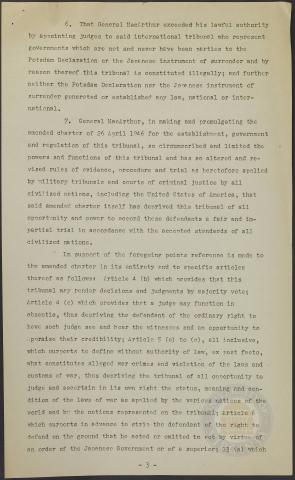
Page 3
| Parent | Motion to Dismiss on Behalf of all Defendants |
|---|---|
| Date | June 1946 |
| Language | English |
| Collection | Tavenner Papers & IMTFE Official Records |
| Box | Box 3 |
| Folder | General Reports and Memoranda from June 1946 |
| Repository | University of Virginia Law Library |
6.That General MacArthur exceed his lawful authority by appointing judges to said international tribunal who represent governments which are not and never have been parties to the Potsdam Declaration or the Japanese instrument of surrender and by reason thereof this tribunal is constituted illegally; and further neither the Potsdam Declaration nor the Japanese instrument of surrender generated or established any law, national or international.
7.General MacArthur, in making and promulgating the amended charter of 26 April 1946 for the establishment, government and regulation of this tribunal, so circumscribed and limited the powers and functions of this tribunal and has so altered and revised rules of evidence, procedure as heretofore applied by military tribunals and courts of criminal justice by all civilized nations, including the United States of America, that said amended charter itself has deprived this tribunal of all opportunity and power to accord these defendants a fair and impartial trial in accordance with the accepted standards of all civilized nations.
In support of the foregoing points reference is made to the amended charter in its entirety and to specific articles thereof as follows: Article 4 (b) which provides that this tribunal may render decisions and judgments by majority vote; Article 4 (c) which provides that a judge may function in absentia, thus depriving the defendant of the ordinary right to have such judge see and hear the witnesses and an opportunity to appraise their credibility; Article 5 (a) to (c), all inclusive, which purports to define without authority of law, ex post fact, what constitutes alleged war crimes and violation of the laws and customs of war, thus depriving the tribunal of all opportunity to judge and ascertain in its own right the status, meaning and condition of the laws of war as applied by the various nations of the world and by the nations represented on the tribunal; Article 6 which purports in advance to strip the defendant of the right to defend on the ground that he acted or omitted to act by virtue of an order of the Japanese Government or of a superior; 13 (a) which
-3-
